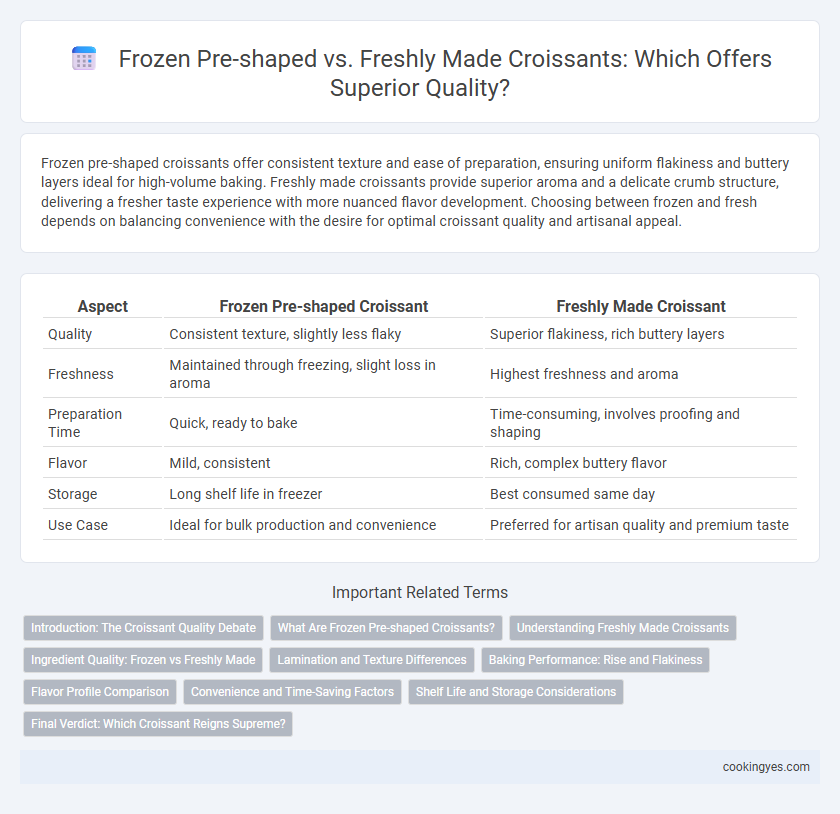Frozen pre-shaped croissants offer consistent texture and ease of preparation, ensuring uniform flakiness and buttery layers ideal for high-volume baking. Freshly made croissants provide superior aroma and a delicate crumb structure, delivering a fresher taste experience with more nuanced flavor development. Choosing between frozen and fresh depends on balancing convenience with the desire for optimal croissant quality and artisanal appeal.
Table of Comparison
| Aspect | Frozen Pre-shaped Croissant | Freshly Made Croissant |
|---|---|---|
| Quality | Consistent texture, slightly less flaky | Superior flakiness, rich buttery layers |
| Freshness | Maintained through freezing, slight loss in aroma | Highest freshness and aroma |
| Preparation Time | Quick, ready to bake | Time-consuming, involves proofing and shaping |
| Flavor | Mild, consistent | Rich, complex buttery flavor |
| Storage | Long shelf life in freezer | Best consumed same day |
| Use Case | Ideal for bulk production and convenience | Preferred for artisan quality and premium taste |
Introduction: The Croissant Quality Debate
Frozen pre-shaped croissants offer consistent texture and flavor due to controlled fermentation and production environments, ensuring uniformity in flakiness and buttery taste. Freshly made croissants, however, boast superior aroma and delicate crumb structure attributed to immediate baking and minimal ingredient degradation. This quality debate centers on balancing convenience and shelf-life against artisanal freshness and sensory experience.
What Are Frozen Pre-shaped Croissants?
Frozen pre-shaped croissants are partially baked dough products that have been shaped, chilled, and then frozen to preserve freshness and facilitate quick baking. These croissants offer consistency in size, shape, and texture, ensuring uniform quality in commercial production environments. While they provide convenience and reduced preparation time compared to freshly made croissants, they may lack the complex flavor and flaky texture achieved through traditional fresh dough lamination and proofing.
Understanding Freshly Made Croissants
Freshly made croissants offer superior texture and flavor due to the careful lamination and fermentation process that develops distinct flaky layers and rich buttery taste. The artisanal preparation allows precise control over dough temperature and proofing times, enhancing the croissant's golden crust and tender interior. Unlike frozen pre-shaped dough, fresh dough retains optimal moisture and yeast activity, resulting in a croissant that delivers exceptional aroma and a delicate crumb structure.
Ingredient Quality: Frozen vs Freshly Made
Frozen pre-shaped croissants often rely on stabilizers and preservatives to maintain dough structure during freezing, which can affect the ingredient quality and result in a less delicate crumb and flavor. Freshly made croissants utilize high-quality, unaltered ingredients, allowing for optimal yeast activity and butter distribution, enhancing flakiness and taste. Ingredient freshness directly impacts the texture and aroma, making freshly made croissants superior in ingredient integrity compared to frozen counterparts.
Lamination and Texture Differences
Frozen pre-shaped croissants often experience slight degradation in lamination due to ice crystal formation affecting the butter layers, resulting in a less flaky and slightly denser texture compared to freshly made croissants. Freshly made croissants retain optimal lamination with distinct, evenly spaced layers, producing a light, airy, and crisp texture that defines high-quality pastries. Temperature control during freezing and thawing is critical to minimize texture loss and preserve the signature flakiness in frozen dough.
Baking Performance: Rise and Flakiness
Frozen pre-shaped croissant dough provides consistent rise and predictable flakiness due to controlled fermentation and handling, ensuring uniform layers and texture in commercial baking. Freshly made croissants often achieve superior flakiness and delicate rise from immediate shaping and baking, capturing optimal gluten structure and butter distribution. Temperature control and dough freshness directly influence oven spring and the characteristic airy, laminated layers essential for premium croissant quality.
Flavor Profile Comparison
Frozen pre-shaped croissants often exhibit a slightly muted flavor profile due to the freezing process, which can dull the buttery and nutty notes typically present in freshly made croissants. Freshly made croissants deliver a more complex aroma and richer taste, showcasing pronounced layers of caramelized butter and subtle yeast fermentation. The textural integrity of freshly made croissants enhances flavor perception, creating a more vibrant and satisfying eating experience compared to frozen counterparts.
Convenience and Time-Saving Factors
Frozen pre-shaped croissant dough offers significant convenience and time-saving benefits by eliminating the need for extensive preparation and proofing time, making it ideal for busy bakeries and cafes. Freshly made croissants, while often superior in flavor and texture due to immediate production, require hours of skilled labor and careful temperature control, limiting their practicality in fast-paced environments. Utilizing frozen pre-shaped dough streamlines workflow, reduces waste, and ensures consistent quality, providing an efficient solution for maintaining high standards without sacrificing valuable time.
Shelf Life and Storage Considerations
Frozen pre-shaped croissants offer extended shelf life, typically lasting several months when stored at consistent freezing temperatures, preserving dough quality and reducing waste. Freshly made croissants provide superior flavor and texture but require immediate consumption or refrigeration within 1-2 days to maintain optimal freshness. Proper storage for frozen croissants involves airtight packaging to prevent freezer burn, while freshly made ones demand moisture-controlled environments to avoid staling.
Final Verdict: Which Croissant Reigns Supreme?
Freshly made croissants consistently deliver superior flakiness, aroma, and buttery richness compared to frozen pre-shaped versions, which often sacrifice texture and flavor due to prolonged storage and freezing processes. Artisanal bakeries emphasize the importance of fresh dough layering and optimal proofing to achieve the perfect crumb structure and delicate crispiness. While frozen pre-shaped croissants offer convenience and consistent shape, freshly baked croissants ultimately reign supreme in quality, taste, and sensory experience.
Frozen Pre-shaped vs Freshly Made for Croissant Quality Infographic

 cookingyes.com
cookingyes.com